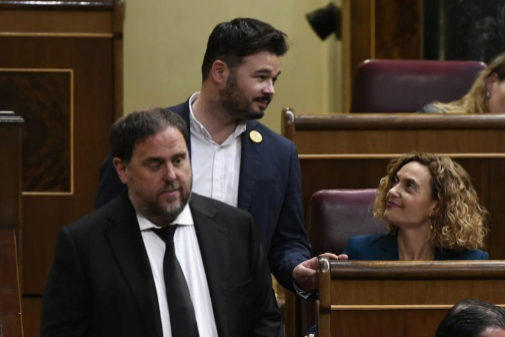- Justice: The Supreme Court takes the Euro-order conflict to the EU Court
- Procés. The four pillars of the 1-O ruling: the Government, the Parliament, the Mossos and street agitation
The decision of the Court of Justice of the European Union (CJEU) on the immunity of Oriol Junqueras will not come before the Supreme Court ruling. The Luxembourg court reported last week that the hearing to address the matter will be held on October 14, which means that the decision will not interfere with the High Court ruling on the 1-O trial. On that date there will be a decision of the court that tried the process . The Supreme is scheduled to pass the sentence in early October. In any case, before the 15th of that month, when the jordis - Jordi Sànchez and Jordi Cuixart - serve two years of provisional imprisonment. Leaving that date would force the Supreme to process an extension of the precautionary measure, something that the magistrates want to avoid.
The CJEU's communication, advanced by TV3 , also indicated that the president of the court has accepted the proposal of the Supreme Court to process the Junqueras case by the "accelerated" route. That means expediting the usual deadline for resolving the question referred for a preliminary ruling - over a year - but not enough for the answer to arrive before the sentence. The CJEU regulation contemplates a procedure of "urgency" that would have allowed Luxembourg to advance the Supreme Court, but is reserved for matters that must directly resolve a question of imprisonment or liberty, which is not the case.
The thesis of Junqueras, which his lawyer will defend in view of the 14th, is that the mere proclamation as elected by the JEC activates the immunity that the European Parliament provides for its members during the session, which began last 2 of July. On the contrary, the Supreme thesis is that the form of full access to the post of MEP remains in the hands of each country. And Junqueras has not complied with the procedures of Spanish law so it has not been included in the official list of MEPs sent to Brussels . Nevertheless, the Supreme Court agreed to take the matter to the CJEU because "there is no express ruling" of the European court on several of the aspects in question. Both the Prosecutor's Office and the State Advocacy were opposed to raising the issue by estimating that it was clear that Junqueras could not acquire immunity. In the proceedings before Luxembourg, all members of the EU who wish may also present their opinion. But the key opinion will be that of the general lawyer, who does not bind the CJEU but whose opinion usually ends up reflected in the sentences.
The decisions of the EU Court are mandatory. In the case of a decision favorable to Junqueras that granted him immunity, it is most likely that the independence leader would be released even if a firm conviction weighs on him. The Supreme Court would then launch the request to obtain authorization from the European Chamber to act criminally against him, in that case to execute the penalty already imposed. The decision of the CJEU would have no impact on the rest of those prosecuted by the 1-O.
The situation of Puigdemont
The Supreme accepted on July 1 to bring the immunity of Junqueras to the CJEU. This was requested by the affected party after verifying that the high court did not allow him to leave prison to complete before the Central Electoral Board (JEC) the procedures - essentially swearing the Constitution - to be declared MEP.
In parallel to the case of Junqueras, the CJEU must also resolve the situation of former President Carles Puigdemont, escaped from Justice and also elected MEP. He did not appear in Spain to complete the proceedings before the JEC - he would have been arrested -, so he did not enter the list of elected officials sent to the Eurocamara. The former president cautiously requested that he be allowed to attend the Eurocamara constitution plenary session on July 2.
The resounding terms in which the measure was denied reinforce the conviction that exists in the Supreme Court that the final decision will be contrary to the interests of Junqueras and Puigdemont, leaders of the parties that proclaimed the "Catalan Republic" on October 27, 2017 Therefore, there would be no problems to execute a conviction of the ERC leader or to continue promoting the case against the defendant fled reactivating the Euroorder.
The decision of the Supreme Court that sent the Junqueras case to Luxembourg took the opportunity to criticize that the Justice of Belgium and Germany rejected Puigdemont's delivery requests, something "difficult to understand." And he said that part of the rejection that Junqueras can go to the headquarters of the Europarliament is the distrust that these decisions generated in the Spanish High Court.
According to the criteria of The Trust Project
Know more- Oriol Junqueras
- Jordi Sanchez
- Jordi Cuixart
- ERC
- Politics
- 1-O trial
- Referendum in Catalonia
PoliticsJxCat offers ERC to "reverse" its pact with the PSC in the Diputación de Barcelona
Politics Secessionists bet on the re-election of Pedro Sánchez
President of FomentJosep Sánchez Llibre: "I will try to repeat Pedralbes. There are complicities between Sánchez and Torra"

